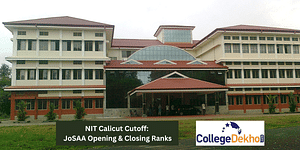Diploma in Architecture Syllabus & Subjects 2025
Diploma in Architecture syllabus and subjects 2025 prioritises core areas like interior designing and project management. Divided across three years, it includes practicals, elective subjects, and distance learning options. Get complete insight into entrance exam topics, essential books, and course specialisations.
Diploma in Architecture Syllabus and Subjects 2025
The Diploma in Architecture course spans three years and is painstakingly structured to offer the student an in-depth knowledge of architectural design, construction methods, and building planning. It is apt for a student who has completed his/her 10th standard and aims at stepping into the world of architecture.
The entire syllabus interlaces theory with practice with core subjects such as Architectural Design, Structural Engineering, Interior and Exterior Design, Building Construction, and Construction Project Management. The diploma is also supported by workshops, live projects, and Design Labs to build practical and employment-ready skills.
The 2025 Diploma in Architecture course curriculum is structured across six semesters, gradually progressing from fundamental knowledge in the first year to advanced architectural concepts in the third year. With a strong focus on both residential and commercial architecture, green building technologies, and sustainable design, the course offers various specialisations to cater to modern industry demands. This program lays a strong foundation for higher education, such as B.Arch and other advanced architectural studies.
Table of Contents
- Diploma in Architecture Syllabus and Subjects 2025
- Overview of Diploma in Architecture Syllabus and Subjects 2025
- Year-Wise Syllabus of Diploma in Architecture 2025
- Diploma in Architecture Syllabus for Distance Programs 2025
- Diploma in Architecture Subjects 2025
- Common Subjects for Diploma In Architecture
- Elective Subjects for Diploma in Architecture
- Lab Subjects for Diploma in Architecture
- Syllabus of Diploma in Architecture Entrance Exam 2025
- Important Books For Diploma in Architecture
- Diploma in Architecture Course Structure 2025
- Specialisations offered in Diploma in Architecture 2025
- FAQs about Dip. in Architecture Syllabus
Overview of Diploma in Architecture Syllabus and Subjects 2025
Diploma in Architecture is meant to help budding architecture students make a clear distinction about the course structure. The syllabus includes every important academic, technical, and practical aspect one should be acquainted with, be it in preparation for higher studies or working in architectural design and construction.
Particulars | Details |
|---|---|
| Course Name | Diploma in Architecture |
| Course Duration | 3 Years (6 Semesters) |
| Academic Level | Diploma-Level (Post-Secondary) |
| Eligibility Criteria | 10th Pass with Minimum 55% from a Recognised Board |
| Course Mode | Full-Time / Distance Learning |
| Course Structure | Theory, Practical Labs, Workshops, Seminars, and Design Projects |
| Specialisations Offered | Residential Architecture, Commercial Architecture, Restoration, Landscape, Green Design, Interior Design |
| Entrance Exams Accepted | AP POLYCET, TS POLYCET, Delhi CET, NATA |
| Average Starting Salary | INR 1.2 – 1.8 LPA (May Vary with Experience and Role) |
| Major Recruiting Sectors | Architecture Firms, Real Estate, Construction Companies, Railways, Housing Boards |
Year-Wise Syllabus of Diploma in Architecture 2025
Year Wise Syllabus of Diploma in Architecture provides an outline of the academic journey through three years, which focuses equally on theoretical knowledge and practical training. On entering higher years, the topics become advanced and include design principles, structural engineering, interior and exterior planning, and project management. It encourages working workshops, drafting exercises, and applications in the practical industry so that students are ready to take up industry jobs or advanced studies outside.
Diploma in Architecture First Year Syllabus
The first year introduces core principles such as civil drafting and communication. Practical skills are enhanced through workshops and graphic presentations. This will help you develop a strong base in architectural concepts and tools.
Diploma in Architecture Syllabus Semester 1 | |
|---|---|
| Mathematics | Business Communication |
| Information Technology | Graphic Presentation and Art (Practical) |
Diploma in Architecture Syllabus Semester 2 | |
| Civil Draftsman and Architecture | Civil Draftsman and Architecture |
| Engineering Drawing | Engineering Drawing |
Diploma in Architecture Second Year Syllabus
In the second year, you will dive into real-world applications such as structural engineering and interior design. The balance between theory and practice ensures industry-oriented learning.
Diploma in Architecture Syllabus Semester 3 | |
|---|---|
| Architectural Design | Building Construction |
| Structural Engineering | General Workshop Practice - II (Practical) |
Diploma in Architecture Syllabus Semester 4 | |
| Construction Project Management | Estimation and Costing Basics |
| Interior and Exterior Design | Interior Drafting (Practical) |
Diploma in Architecture Third Year Syllabus
The final year prepares students for specialisation and employment. Advanced topics will allow you to integrate and showcase all your skills.
Diploma in Architecture Syllabus Semester 3 | |
|---|---|
| Concrete Technology | Estimation, Costing, and Specifications |
| Foundation Design | General Workshop Practice - III (Practical) |
Diploma in Architecture Syllabus Semester 4 | |
| Project Work/Final Design Portfolio | Landscape and Vernacular Architecture |
| Green Building and Sustainability | Final Evaluation and Viva (Practical) |
Also Read: Architecture Courses
Diploma in Architecture Syllabus for Distance Programs 2025
The Diploma in Architecture syllabus for Distance program 2025 proposes to give students the architectural education flexible enough yet comprehensive. The curriculum combines basic architecture-related Principles with technical subjects such as CAD, engineering mechanics, and project management. It also includes marine engineering and environmental studies to cater to different industries.
Subject | Details |
|---|---|
| Electrical Technology | Introduction to electrical circuits, systems, and their applications in architectural layouts and smart buildings. |
| Computer Programming | Basics of programming languages with relevance to architectural tools and design automation. |
| Manufacturing Technology & Practices | Overview of production processes, construction techniques, and modern fabrication methods used in architecture. |
| Engineering Mathematics | Core mathematical concepts including algebra, calculus, and statistics used in engineering analysis and building design. |
| Marine Engineering | Concepts of marine structures and systems, focusing on floating and underwater construction engineering. |
| Ship Drawing | Technical and detailed drawing methods used in naval architecture for designing marine vessels. |
| Marine Industry Safety | Health and safety protocols, hazard identification, and regulations for marine and offshore construction environments. |
| Thermodynamics | Study of heat transfer, energy systems, and their applications in sustainable architectural design. |
| Engineering Mechanics | Analysis of forces, motion, equilibrium, and material mechanics in architectural and civil structures. |
| Engineering Drawing & CAD | Introduction to manual and computer-aided design (CAD) for creating architectural and structural drawings. |
| Environmental Chemistry | Chemical processes affecting construction environments, including pollution control and eco-friendly materials. |
| Project Management | Techniques in planning, executing, and managing architecture or infrastructure projects effectively. |
| Naval Architecture | Principles of designing marine structures like ships, including buoyancy, stability, and structural integrity. |
Diploma in Architecture Subjects 2025
Diploma in Architecture subjects 2025 focus on developing technical, creative, and managerial skills essential for a successful architecture career.
| Subjects in Diploma in Architecture 2025 | |
|---|---|
| Building Construction | Interior and Exterior Design |
| Business Communication | Structural Engineering |
| Architectural Design | Information Technology |
Also Read: Diploma in Architecture Colleges in India
Core Subjects For Diploma in Architecture 2025
It is designed to establish a solid foundation in architectural concepts, methods, and technology. These technical subjects are taught side by side with Business Communication and Information Technology to foster professional and digital skills. All these core subjects, together, prepare you for actual problems in the field.
Core Subject | Details |
|---|---|
| Building Construction | Covers construction methods, techniques, and materials used in the development of structures. Focuses on foundations, walls, roofs, and flooring systems. |
| Interior and Exterior Design | Involves the planning and designing of aesthetically functional indoor and outdoor spaces to meet client and environmental needs. |
| Business Communication | Develops professional communication skills, including verbal, written, and presentation techniques essential for client interaction and teamwork. |
| Structural Engineering | Introduces concepts of load-bearing structures, forces, materials, and design of structural elements like beams, columns, and trusses. |
| Architectural Design | Focuses on the fundamentals of design, form, and spatial organisation, encouraging creativity and conceptual thinking through drawings and models. |
| Information Technology | Teaches the use of digital tools, software, and IT systems in architectural drafting, planning, and project management. |
Also Read: Top Architecture Colleges in India 2025
Common Subjects for Diploma In Architecture
It aims to give students a secure and reliable foundation over the whole course. Building Construction, Structural Engineering, Interior and Exterior Design, Foundation Design and Communication are the basis for knowing architectural principles. They give students both the knowledge and skills they need for success in different design and construction industries.
Common Subject | Details |
|---|---|
| Interior and Exterior Design | Teaches the creative and technical aspects of designing functional and visually appealing indoor and outdoor spaces. |
| Building Construction | Introduces fundamental techniques, processes, and materials used in the construction of residential and commercial buildings. |
| Structural Engineering | Focuses on the analysis and design of structural elements to ensure safety, stability, and durability of buildings. |
| Communication | Enhances verbal and written communication skills essential for effective teamwork, client interactions, and professional presentations. |
| Foundation Design | Covers methods of planning and designing strong, durable building foundations based on soil analysis and load calculations. |
Also Read: B.Arch Admission 2025
Elective Subjects for Diploma in Architecture
Students will be offered an opportunity to select specialised areas of interest within the architectural field. These subjects complement the core course by deepening knowledge about Green Building, Sustainable Architecture, Landscape Architecture, Vernacular Architecture, and Interior Detailing. Electives allow students to customise their study according to their preferred career, stimulating innovation and higher design thinking. They contribute substantially to broadening the professional perspective and nurturing niche expertise in architecture.
Elective Subject | Details |
|---|---|
| Green Building | Focuses on environmentally responsible design and construction practices using sustainable materials and energy-efficient technologies. |
| Sustainable Architecture | Covers eco-friendly design principles, resource conservation, and building techniques that reduce environmental impact. |
| Mitigation and Design | Explores design strategies to reduce risks from natural disasters like floods, earthquakes, and fires. |
| Vernacular Architecture | Studies traditional architectural styles, materials, and methods adapted to specific cultures and climates. |
| Interior and Exterior Design | Enhances aesthetic and functional planning of indoor and outdoor spaces based on client requirements and environmental factors. |
| Interior Detailing | Provides in-depth knowledge of fixtures, finishes, materials, and joinery used in interior architecture. |
| Landscape Architecture | Teaches planning and design of outdoor environments, parks, and open spaces with a focus on ecological balance and user experience. |
Also Read: Top B.Arch Colleges in India 2025
Lab Subjects for Diploma in Architecture
Lab subjects for Diploma in Architecture constitute an essential segment of the student curriculum, providing them exposure to hands-on experience in different design and construction techniques. These subjects inculcate the application of theoretical concepts into real-world situations through workshops, model making, drawing exercises, and digital tools. Lab work also stimulates creativity, accurate technical outputs, and problem-solving skills to make students ready for the industry. It also improves students' communication skills to express their design ideas through visual and structural representation.
Lab Subject | Details |
|---|---|
| Graphic Presentation and Art | Focuses on developing visual communication skills through freehand sketching, rendering, and artistic drawing techniques. Enhances creativity and spatial understanding. |
| General Workshop Practice - I | Introduces students to basic workshop tools, model-making techniques, and manual construction practices to understand material behavior and design execution. |
| General Workshop Practice - II | Builds on foundational workshop skills with more advanced projects involving construction joints, scaled models, and prototype development. |
| General Workshop Practice - III | Focuses on refining hands-on architectural skills through complex models, material handling, and integrating design elements with real-world applications. |
Also Read: Top M.Arch Colleges in India 2025
Syllabus of Diploma in Architecture Entrance Exam 2025
The Diploma in Architecture Entrance Exam Syllabus is created to measure a candidate’s basic knowledge of Mathematics, Physics, and Chemistry, taken at the Class 10 level. Here are some of the common entrance exams for a diploma in architecture.
AP POLYCET Exam: AP POLYCET syllabus includes Class 10 level topics in Mathematics (geometry, real numbers), Physics (heat, light), and Chemistry (acids, chemical bonding), focusing on basic scientific and numerical concepts relevant to polytechnic programs.
TS POLYCET Exam: TS POLYCET syllabus includes Class 10 curriculum on coordinate geometry, algebra, motion, reflection, chemical reactions and water technology are discussed in the syllabus to measure learning and problem-solving skills in science.
DELHI CET Exam: Delhi CET syllabus includes Mathematics (algebra and trigonometry), Physics (electricity and sound) and Chemistry (chemical reactions and acids and bases), helping make sure students have a fair knowledge of basic science and math.
NATA Syllabus: NATA syllabus covers Mathematics, General Aptitude (logical reasoning and architectural ideas) and a section on Drawing to assess your sketching, how well you can show proportions and visualise in three dimensions. The test checks both your analytical skills and your creative side, important for architecture.
Important Books For Diploma in Architecture
The market is flooded with numerous books. Candidates need to pick the best books while studying for a Diploma in Architecture course. Some of the best books for Diploma in Architecture suggested by experts and toppers have been listed below. It is advisable to go through these books and study from them after referring to the syllabus.
| Diploma in Architecture Books | Diploma in Architecture Book Author(s) |
|---|---|
| Civil Drafting Technology | David A. Madsen Emeritus, Terrence M. Shumaker |
| Construction Project Management - Tips and Insights | Paul Netescher |
| Concrete Technology - Theory and Practice | A.K. Jain, M.S. Shetty |
| Fundamentals of Building Construction - Materials and Methods | Edward Allen |
Also read: B.Arch Admission 2024
Diploma in Architecture Course Structure 2025
Diploma in Architecture Course is designed in a way to impart knowledge in the field of architectural design. In this course, the students get to learn from basic concepts to advanced aspects of science. The course structure of the Diploma in Architecture in India is so far divided into 3 years duration that is, in general, segregated into six semesters.
There are 5-8 subjects every semester having core and elective subjects. Students also undergo practical training, and workshops. Portfolio submission and working on numerous projects is also a part of the Diploma in Architecture Course structure.
Diploma holders in Architecture programs can find employment as interior designers, automotive designers, assistant architects, teachers, layout designers, etc. Depending on their qualifications and experience in the relevant fields of work, these experts can easily make an annual salary between INR 1,20,000 and 1,80,000. Candidates may find a variety of potential career and employment opportunities after completing this course in major employment sectors such as educational institutions, civil engineering departments, construction companies, airports, the housing industry, railways, etc.
Quick Link: Career as Architect
Specialisations offered in Diploma in Architecture 2025
Diploma in Architecture subjects include in-depth technology, design, and building curriculum that emphasises students' expertise. Additionally, a course leading to a diploma in architecture gives students specialised theoretical and practical understanding in fields including design and building. As a result, students interested in building the exterior and interior of physical structures and infrastructure should take the Diploma in Architecture course. This course provides a wide aspect of specialisations some of which are-
- Residential Architecture- Residential architecture is essentially the process of planning and constructing residential, and non-commercial homes, and living spaces. Apartment buildings, mansions, and everything in between are all examples of residential architecture.
- Commercial Architecture- It is the practice of designing buildings that are specifically suited to a commercial or business environment.
- Restoration Architecture- The preservation of old structures and cities can be accomplished through restoration architecture, which is a planned and regulated intervention. The preservation of historical works has several obvious and less obvious benefits.
- Landscape Architecture- Planning, designing, managing, and maintaining both the constructed and natural surroundings are all part of landscape architecture. With their special set of abilities, landscape architects seek to enhance the well-being of both people and the environment in all communities.
- Green Design Architecture- Green architecture is an architectural concept that supports renewable energy sources, energy efficiency, the safe reuse of building materials, and the location of structures while taking the environment into account.
- Interior Design- The art and science of enhancing a building's interior to provide a better and more aesthetically pleasant atmosphere for those using the area is known as Interior Design.
.png)
FAQs about Dip. in Architecture Syllabus
What is the syllabus for architecture?
Strength of material, interior and exterior design, mathematics, construction project management, civil draftsmen and architecture, and building construction are some of the diploma in architecture subjects.
How many subjects are there in diploma in architecture?
There are approximately 5 to 8 diploma in architecture subjects that cover elective and core subjects.
Which are the diploma in architecture elective subjects?
Green Building, Sustainable Architecture, Mitigation and Design, Vernacular Architecture, Interior and Exterior Design, Interior Detailing, and Landscape Architecture are some of the diploma in architecture elective subjects.
What is diploma in architecture lab subjects?
Basic Design Practical, Engineering Graphics, Architectural Design, Computer Programming, Architectural Drawing, Architectural Design Studio, and Construction Technology are some of the diploma in architecture lab subjects.
Which are the diploma in architecture core subjects?
The core diploma in architecture subjects are Structural Engineering, Building Construction, Interior and Exterior Design, Environmental Science, Building Materials, History of Architecture, Theory of Architecture, and Mechanics of Structures.
Which are the top diploma in architecture books?
Some of the diploma in architecture books are Towards a New Architecture by Le Corbusier, 101 Things I Learned in Architecture School by Mathew Fredrick, Architecture: Form, Space & Order by Francis D.K Ching, Design Like You Give a Damn 2: Building Change from the Ground Up by Cameron Sinclair and Architecture for Humanity.
Which are the diploma in architecture projects?
Some of the diploma in architecture projects prepared by the candidates throughout the tenure are the evaluation of the habitability factor of wet spaces, design of a guest house, proposed, recreational park, evaluation of public houses, domestic architecture, and evaluation of fashion house building.
What are the Diploma in Architecture Teaching Methodology and Techniques?
Some of the methodology and techniques adopted in the diploma in architecture syllabus are drawing and sketching sessions, the emphasis on practical learning, experimentation, guest lectures, seminars, workshops, group assignments, discussions, and learning through industrial visits.
What is the Diploma in Architecture Course Structure?
The diploma in architecture course structure consists of core subjects, practical and drawing work, workshops, portfolio submission, and projects.
Popular Courses
- Courses
- Diploma in Architecture
- Syllabus


















